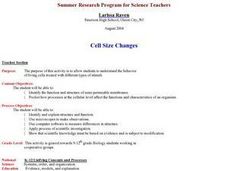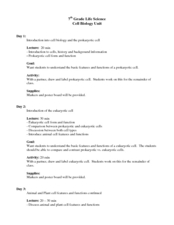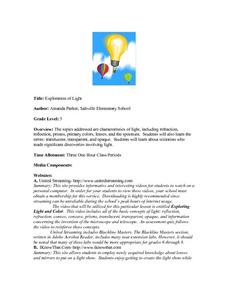Curated OER
Evidence of Photosynthesis
Hands on science is the way to go! Learners conduct a lab experiment to help them explain how plants make food through photosynthesis. They test for the presence of starch in leaves using iodine solution and identify the basic things...
Curated OER
Investigation of Crystallinity in Polymeric Materials
A kaleidoscope is constructed using polarizing polymer paper and then low-density polyethylene, high-density polyethylene, and polypropylene are all melted onto individual glass slides and examined through a microscope. The intent is to...
Curated OER
Elastic Recoil in Arteries and Veins
A lab in which high schoolers examine the difference between arteries and veins. Budding biologists will find out which blood vessel can stretch furthest, recording their data in a table then answering several questions evaluating their...
Curated OER
Studying Living Organisms
Pupils discover and discuss the differences between prokaryotes and eukaryotes. Using a microscope, they examine various prepared slides of prokaryotic and eukaryotic organisms.
Curated OER
Critters in the Classroom
Students investigate with sea urchins. In this ocean habitat lesson, students observe sea urchins and other ocean grazers. Students work with lab equipment to examine the anatomy of these creatures.
Curated OER
CSI, Second Grade Style
Second graders conduct a classroom investigation. In this investigative lesson, 2nd graders spend their time observing, measuring, and collecting data. They simulate a forensic science lab by conducting a fingerprint, scent, footprint,...
Curated OER
Fiber Identification
Lab sheets for three different crime scene investigation activities are tucked into this resource. In the first activity, inquisitors examine a variety of fibers, including the fiber found at "the crime scene," under ultraviolet light....
Curated OER
Comparing the Amoeba to Paramecium
This laboratory activity is valuable practice in comparing features of different organisms. You could use it to introduce junior biologists to protozoans. The materials and procudures for the learners are simple, and analysis questions...
Nuffield Foundation
A Closer Look at Blood
Here is a lab that has teenage scientists examining samples of their own blood under a microscope. Learners carefully prepare slides, then make detailed observations and identifying different types of cells using a key.
Curated OER
Chemosynthesis for the Classroom
Explorers set up Windogradsky columns with local mud so that they can culture microorganisms. After three and six weeks they make observations of the mud and the organisms growing in it. In this way they observe succession and relate...
Curated OER
The Parts of a Perfect Flower
Young scholars explore the parts of a flower. In this flower structures lesson plan, students study a model of a flower and dissect a flower. They label each structure of the flower and observe the pollen grains and ovules under the...
Curated OER
What Are the Layers of the Rain Forest?
Students investigate the different levels of the rain forest by comparing it to an apartment. In this ecology lesson, students practice using forest related vocabulary words and complete a vocabulary data sheet. Students create...
Curated OER
Norman Suburban Activity
Students analyze the factors affecting organisms in the pond ecosystem. In this environmental science lesson, students perform an experiment to determine pH, nutrients and temperature of different pond sites. They present their result to...
Curated OER
Applied Science - Science and Math Pre Lab
Students explore human senses. In this applied Science lesson, students utilize their senses to distinguish various objects. Students explain their descriptions.
Curated OER
The Effect of Natural Selection on Genes, Traits and Individuals
Rotating through five stations, evolutionary biologists explore the question of how changes in DNA facilitate the changes in a population over time. High-quality, colorful cards of animals, skeletons, skulls, and DNA sequences can all be...
Curated OER
What Kind of Insect is That?
Fifth graders characterize insects and classify insects according to the Linnaean system. They use hand lenses or microscopes to examine insect body parts.
Curated OER
Biological Sampling Device Using a Sea Perch
Pupils construct plankton nets to be towed and collect specimens to be examined and analyzed in the classroom. They develop research skills through collection of an aquatic sample. They write lab reports after interpreting, identifying...
Curated OER
Animal Organs and the Study of Reproduction, Embryology and Cancer
Students examine organs from dogs and cats to study reproduction, embryology, and the identification of cancer. They record their observations at both the gross and microscopic levels. They present their information to the class.
Curated OER
Cell Size Changes
Students examine the behavior of living cells treated with different types of stimuli. They watch an online movie, examine wet mount slides under a microscope, take an online quiz, and analyze data.
Curated OER
Using Magnetotactic Bacteria to Study Natural Selection
Students observe bacteria that are able to orient themselves using the Earth's magnetic field.They comprehend the difference between anaerobic and aerobic organisms. Students can tell the difference of the shape of magnetic force field...
Curated OER
Mission Possible
Students, in teams, solve a crime using forensic lab techniques. They apply lab techniques to a real life situation using a crime scenario that takes place on campus. Sample activities include Blood, Fiber, and Hair Lab.
Curated OER
Sea Urchin Embryology
Students explore the process of evolution. They examine examples of how homeotic genes may work and obtain gametes. Using a microscope, students observe the fertilization of sea urchins. They video tape the process and write a...
Curated OER
Cell (Biology)
Students conduct a series of activities to explore the nature of cells. In this biology lesson, students observe plant and animal cells under the microscope and compare them. They differentiate osmosis and diffusion.
Curated OER
Exploration of Light
Fifth graders observe the video, Exploring Light and Color. They access a website to create their own light show. They conduct lab experiments to investigate refraction, reflection,and other light-related topics.

























